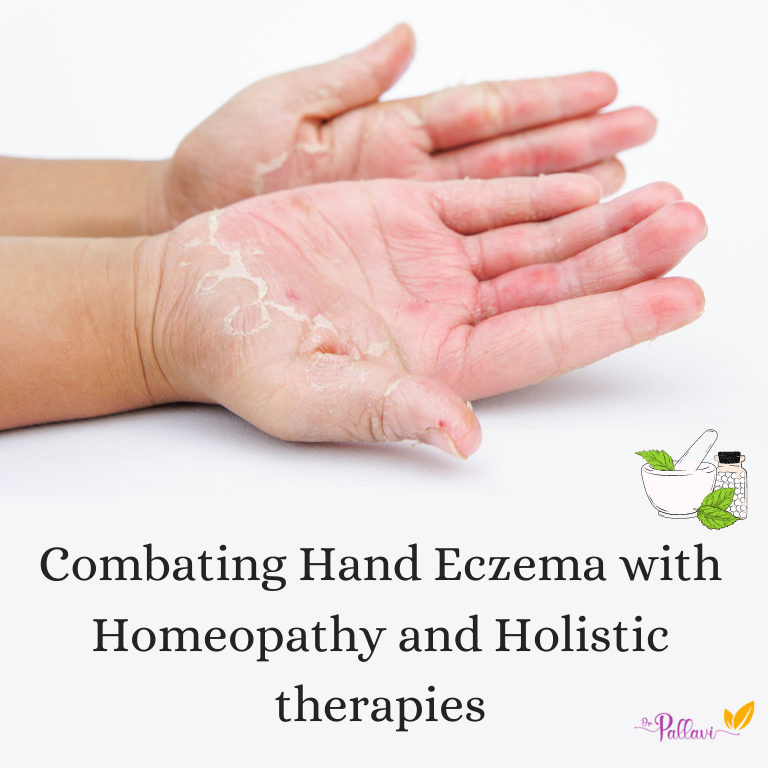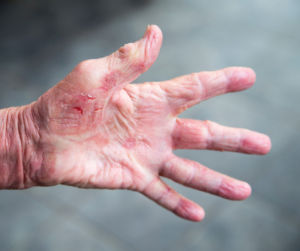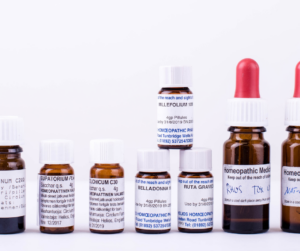
“Combating Hand Eczema with Homeopathy and Holistic Wellness”
Did you know that hand eczema affects around 10% of the population worldwide?
In fact, it is one of the most common occupational skin diseases, affecting people who work in healthcare, catering, cleaning, and hairdressing industries the most.
Additionally, studies suggest that around 35% of healthcare workers develop hand eczema at some point in their career.
Hand eczema is a chronic condition that causes skin inflammation, redness, dryness, itching, and blistering on the hands. It can be a debilitating condition that affects a person’s ability to work and carry out daily activities.
In this blog, we will explore how homeopathy and holistic therapies can help combat hand eczema, providing natural and effective ways to manage and alleviate symptoms.
We will discuss various remedies, therapies, and lifestyle changes that can make a significant difference in managing hand eczema, allowing you to lead a more comfortable life.
So, let’s dive into the world of homeopathy and holistic therapies to combat hand eczema.

Causes of Hand Eczema:
Hand eczema can be caused by a variety of factors, including exposure to irritants and allergens, genetic predisposition, stress and anxiety, climate or weather changes, and a weakened immune system.
- Exposure to irritants is one of the most common causes of hand eczema. The irritants can damage the outer protective layer of the skin, leading to dryness, redness, and inflammation. These irritants can be found in various everyday products such as soaps, detergents, cleaning products, solvents, or chemicals. People who work in specific industries, such as cleaning or healthcare, are particularly at risk of developing hand eczema due to frequent exposure to these irritants. According to the American Academy of Dermatology, irritants are the most common cause of hand eczema, accounting for around 75% of cases. In a study published in the journal Contact Dermatitis, up to 50% of healthcare workers reported experiencing hand eczema due to exposure to irritants in their work environment.
- Exposure to allergens can also cause hand eczema. Some people may develop hand eczema due to an allergic reaction to certain substances such as fragrances, metals (like nickel), rubber, or latex gloves. People with a history of allergies or family members with allergies are at greater risk of developing hand eczema due to allergen exposure. Allergic contact dermatitis (ACD) is a common cause of hand eczema, accounting for around 20-30% of cases. According to the American Contact Dermatitis Society, nickel is the most common allergen that causes ACD.
- Genetic predisposition is another factor that can increase the risk of developing hand eczema. Some people may have a genetic predisposition to eczema, making them more susceptible to developing hand eczema. This means that if a family member has eczema, there is a greater chance that you may develop it as well. According to the National Eczema Association, around 60% of people with eczema have a family history of the condition. A study published in the British Journal of Dermatology found that a family history of eczema was associated with an increased risk of hand eczema.
- Stress and anxiety can also trigger hand eczema. Stress and anxiety can weaken the immune system and trigger an inflammatory response, leading to hand eczema. This is particularly true for people with a genetic predisposition to eczema.
- Climate or weather changes can also compel hand eczema in some individuals. Cold, dry weather or exposure to excessive heat and humidity can dry out the skin and lead to hand eczema.
- Finally, a weakened immune system can also increase the risk of developing hand eczema. Certain medical conditions, such as HIV, diabetes, or thyroid disorders, and medications, such as chemotherapy or immunosuppressants, can weaken the immune system and increase the risk of developing hand eczema.
So, hand eczema can be caused by a variety of factors, including exposure to irritants and allergens, genetic predisposition, stress and anxiety, climate or weather changes, and a weakened immune system. Understanding the causes of hand eczema is an important step in preventing and treating the condition.
While there are conventional treatment options available for hand eczema, they often come with potential side effects and may not be suitable for everyone. For example, topical corticosteroids can cause skin thinning and discoloration with long-term use, while topical calcineurin inhibitors can increase the risk of skin infections and certain types of cancer.
In contrast, holistic approaches such as homeopathy, herbal remedies, and lifestyle modifications offer a gentler and safer alternative for managing hand eczema. These natural treatments work with the body’s own healing mechanisms to restore balance and promote overall well-being without the risk of harmful side effects.

Homeopathy for Hand Eczema
Homeopathy is a holistic form of medicine that was developed in the late 18th century by a German physician named Samuel Hahnemann. The philosophy behind homeopathy is based on the principle of “like cures like.” This means that a substance that can cause symptoms in a healthy person can also be used to treat those similar symptoms in a sick person.
Homeopathic remedies are made from natural substances, such as plants, minerals, and animal products, that have been diluted and potentized. This means that the original substance is diluted in water or alcohol and then shaken vigorously to activate its healing properties.
In the case of hand eczema, a homeopath would consider the individual’s symptoms, as well as their overall physical, emotional, and mental state, to select a remedy that matches their unique needs.
Several homeopathic remedies are helpful to relieve hand eczema, including:
- Graphites: This remedy is often recommended for crusty, itchy, and oozing eczema. It can also be helpful for eczema that is worse in the winter.
- Sulphur: This remedy is typically used for dry, itchy, and scaly eczema. It can also be helpful for eczema that is worse in the summer.
- Natrum muriaticum: This remedy is often recommended for eczema that is accompanied by dryness and cracking of the skin, especially on the fingers and palms.
- Rhus tox: Rhus tox is a homeopathic remedy that is used to treat various skin conditions, including eczema. It can help treat skin that is red, swollen, and itchy.
It’s important to note that homeopathy is a highly individualized form of medicine, and the remedies that work best for one person may not be the same as those that work for another. It’s best to consult with a qualified homeopath for personalized advice on which remedies may be best for you & avoid self prescription.

Holistic Approaches to Hand Eczema
In addition to homeopathy, several holistic wellness practices can help prevent or manage hand eczema. These practices can complement homeopathy and other natural treatments and may include the following:
- Stress reduction: Stress can exacerbate hand eczema symptoms, so finding ways to manage stress is critical. This may include practices such as meditation, deep breathing, yoga, & spending time in nature.
- Healthy diet: Proper nutrition is crucial for healing hand eczema from the inside out. Eating a balanced diet rich in essential nutrients such as vitamins A, C, and E, omega-3 fatty acids, and zinc can help support healthy skin function and reduce inflammation. Foods such as fatty fish, nuts and seeds, leafy greens, and colorful fruits and vegetables are all excellent sources of these nutrients. On the other hand, certain foods such as dairy products, gluten, and sugar may exacerbate eczema symptoms in some people. Listening to your body and experimenting with different dietary approaches is essential to find what works best for you.
- Lifestyle changes: Small modifications to your daily routine can also help manage hand eczema symptoms. This may include avoiding harsh soaps and detergents, wearing gloves when cleaning or doing other activities that may irritate the skin, and keeping your hands moisturized.
- Using natural skincare products: According to a survey by the American Academy of Dermatology, fragrance is the number one cause of skin irritation in people with eczema. Furthermore, a study published in the Journal of Clinical and Aesthetic Dermatology found that 45% of skincare products contained ingredients that could cause skin irritation, including parabens, phthalates, and sulfates. These statistics highlight the importance of being mindful of the products we use on our skin, especially if we have hand eczema. Avoiding these harmful ingredients and using natural skin care products can significantly reduce the risk of triggering or aggravating your hand eczema symptoms.
- Maintaining healthy lifestyle habits: This includes practices such as getting enough sleep, staying hydrated, and exercising regularly.
- Avoiding extremes in temperature or humidity– For people with hand eczema, it is crucial to avoid extreme temperatures and moisture as they can worsen symptoms by causing the skin to dry out and become more susceptible to cracking and irritation. Maintaining a consistent and comfortable temperature and humidity level in your environment is essential. To achieve this, consider using a humidifier during winter to add moisture to the air. Avoid hot showers or baths, as they can strip the skin of natural oils. Additionally, wearing gloves during cold weather can help protect your hands from the cold and prevent further irritation. By taking these simple steps, you can reduce the likelihood of triggering hand eczema symptoms and promote healthier, more comfortable skin.
Several natural topical treatments can help soothe the symptoms of hand eczema. Here are some options:
- Coconut oil: Coconut oil is a natural moisturizer that can help hydrate and soothe dry, irritated skin. It contains lauric acid, which has antibacterial and antifungal properties that can help prevent infections. Apply coconut oil to your hands regularly throughout the day.
- Aloe vera: Aloe vera is a natural anti-inflammatory and moisturizer that can help reduce inflammation and soothe irritated skin. Apply fresh aloe vera gel to your hands and let it sit for 10-15 minutes before washing it off.
- Oatmeal: Oatmeal contains anti-inflammatory compounds that can help reduce inflammation and itching. Mix finely ground oatmeal with warm water to make a paste, and apply it to your hands for 10-15 minutes before rinsing it off.
- Chamomile: Chamomile has anti-inflammatory and soothing properties that can help relieve the symptoms of hand eczema. Steep chamomile tea bags in hot water for a few minutes, then cool the tea and apply it to your hands with a cotton ball.
- Witch hazel: Witch hazel is a natural astringent that can help reduce inflammation and itching. Apply witch hazel to your hands with a cotton ball several times daily.
While hand eczema can be a frustrating condition to manage, natural remedies can help. Homeopathy and holistic wellness practices can be effective ways to prevent or manage hand eczema symptoms, and several practical tips can also help.
Here are some statistics and links related to hand eczema, homeopathy, and holistic wellness:
- According to the National Eczema Association, hand eczema affects approximately 10% of the general population and up to 40% of certain occupational groups, such as healthcare workers and hairdressers. (Source: https://nationaleczema.org/eczema/types-of-eczema/hand-eczema/)
- A study published in the British Homeopathic Journal found that homeopathic remedies were effective in treating hand eczema in children. (Source: https://www.ncbi.nlm.nih.gov/pmc/articles/PMC1297510/)
- The American Holistic Health Association provides resources and information on a variety of holistic health practices, including stress reduction, nutrition, and lifestyle changes. (Source: https://ahha.org/selfhelp-articles/holistic-approaches-to-eczema-and-other-skin-conditions/)
- The International Academy of Classical Homeopathy offers information and resources on homeopathy, including a directory of homeopaths. (Source: https://www.vithoulkas.com/)
- The National Center for Complementary and Integrative Health provides information on complementary and alternative medicine, including homeopathy and other holistic health practices. (Source: https://www.nccih.nih.gov/health/homeopathy)
I hope you found today’s blog post informative and useful in managing your hand eczema. If you found this content helpful, please consider sharing it with someone who may also benefit from it.
Don’t forget to like and subscribe to stay updated on our latest posts and receive more helpful tips and insights.
It’s essential to keep in mind that managing hand eczema is a personalized process, and what may work for one person may not be effective for another. If you’re seeking holistic and natural remedies to heal your hand eczema and improve your skin health, I can assist you. By scheduling a discovery consultation, we can discuss your unique needs and identify the most suitable treatment options to help you manage your condition effectively. Don’t hesitate to reach out and take the first step towards achieving healthier, happier skin.
Thank you for reading
